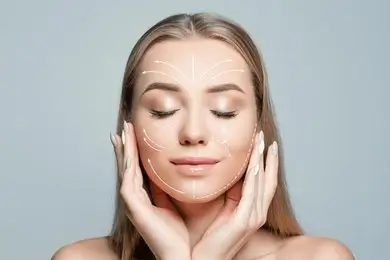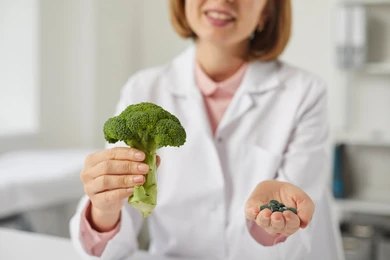As women, our bodies go through beautiful yet complex changes—especially when it comes to hormones. From our 20s to post-menopause, shifts in estrogen, progesterone, and other hormones can deeply impact how we feel, how we age, and even how our skin and joints function. ✨
One powerhouse protein that plays a surprisingly vital role in this journey? Collagen. 💪💆♀️ Often known for its skin-plumping, glow-boosting effects, collagen is also essential for joint support, bone strength, and hormonal balance—yes, really!
In this post, we’ll dive into the fascinating connection between hormonal health and collagen, how they influence each other, and how you can naturally support both to feel and look your best—from the inside out. 🌿💫
Let’s explore what every woman should know about this vital connection. 👇
💎 What Is Collagen and Why It Matters
Let’s talk about collagen, ladies 💁♀️—the unsung hero behind glowing skin, flexible joints, and even that youthful “bounce” we feel in our bodies. Collagen is the most abundant protein in our bodies, often described as the “glue” that holds everything together. It gives structure and strength to our skin, bones, joints, muscles, and even hair and nails. Pretty impressive, right? 💅✨
🌟 The 3 Most Important Types of Collagen for Women
There are at least 28 types of collagen, but just three do most of the heavy lifting when it comes to beauty and wellness:
- Type I – Found in skin, tendons, ligaments, and bones. It’s what helps keep our skin firm and youthful 💖
- Type II – Primarily in cartilage and supports joint health 🤸♀️
- Type III – Works alongside Type I and is found in skin, muscles, and blood vessels 🩸
Understanding these types can help us choose the right supplements and foods to support our body’s needs—especially during hormonal changes like perimenopause or menopause.
⏳ Collagen Production Declines with Age (and Hormones!)
Here’s the catch: our natural collagen production begins to slow down in our mid-20s 😱. Combine that with hormonal shifts—like a drop in estrogen—and you’ve got the perfect recipe for fine lines, joint stiffness, and thinning hair.
That’s why it’s so important to be proactive. Collagen loss isn’t just about vanity—it affects our mobility, bone strength, and overall vitality. The good news? We can absolutely support our bodies to make and maintain more collagen (we’ll get to that soon! 💕).
💬 Your Body, Your Glow
Think of collagen as part of your inner glow team 🌟—alongside your hormones, hydration, and self-care habits. When these elements work together in harmony, you feel stronger, look radiant, and move with more ease. It’s not just about looking younger—it’s about feeling amazing in your own skin at every age. 🧘♀️💫
🌺 The Connection Between Hormones and Collagen
Ever wonder why your skin suddenly feels drier, or your joints ache a little more as you get older—or during that time of the month? 😩 The answer often lies in your hormones, especially estrogen, and their powerful influence on collagen production. Yes, your hormones and collagen are in a constant, delicate dance 💃—and when they fall out of sync, your body feels it.
💕 Estrogen: The Collagen-Boosting Queen
Estrogen does so much for our bodies, but one of its secret superpowers is helping us maintain collagen levels. It supports collagen synthesis, keeps our skin firm and hydrated, and even contributes to bone density and joint flexibility. When estrogen is high (like during pregnancy or ovulation), many women notice their skin looks more radiant and their joints feel great. ✨
But when estrogen levels dip—such as during perimenopause, menopause, or chronic stress—it can lead to:
- Fine lines and sagging skin 🪞
- Joint pain or stiffness 🦴
- Thinner hair and weaker nails 💇♀️
- Slower recovery after exercise 😓
🔄 Other Hormones That Affect Collagen
While estrogen is the star of the show, she’s not performing solo! 🎭 Other hormones also play key roles:
- Progesterone: Helps balance estrogen and supports skin elasticity 🧖♀️
- Testosterone: Important for muscle tone and collagen strength (yes, women have it too!) 💪
- Cortisol (the stress hormone): When it’s too high, it breaks down collagen and speeds up aging 😬
This is why stress management isn’t just good for your mood—it’s essential for your skin, bones, and joints too. 🧘♀️🌿
💬 Hormonal Imbalance = Collagen Disruption
If your hormones are out of balance, your collagen production often suffers—causing everything from dull skin to brittle nails to painful joints. And sometimes, the signs are subtle at first: feeling “off,” noticing more breakouts, or that your usual skincare routine isn’t cutting it anymore. 👀
The good news? Once you recognize the signs, you can begin to nurture both your hormonal health and collagen levels in simple, effective ways (and yes—those tips are coming in the next sections! 💫).
🌟 Collagen Benefits for Skin, Joints, and More
Now that we understand the beautiful bond between collagen and hormones, let’s talk about the real-life benefits—because this protein isn’t just working behind the scenes. It shows up in how you feel every single day 💃✨ Whether you’re noticing signs of aging, recovering from workouts slower than before, or just wanting to feel stronger in your skin, collagen can be a total game-changer. 💕

💆♀️ Skin That Glows From Within
One of the most celebrated benefits of collagen is its ability to transform skin health:
- Boosts elasticity and firmness ✨
- Smooths out fine lines and wrinkles 👋
- Helps skin stay hydrated and plump 💧
- Reduces appearance of scars and stretch marks 🌸
When estrogen levels drop, so does skin thickness and moisture. Supplementing with collagen—or supporting natural production—can help you reclaim that glow and strengthen your skin barrier, especially in your 30s, 40s, and beyond. 🌷
🤸♀️ Joints That Move with Grace
Collagen isn’t just a beauty booster—it’s a joint protector too! 🙌 As we age or go through hormonal changes, joint pain and stiffness can creep in. That’s because collagen cushions our joints, and when it starts to break down, we feel it with every step, stretch, or squat.
Here’s how collagen helps:
- Supports joint flexibility and mobility
- Reduces inflammation and pain
- Aids in faster recovery after workouts or injuries
- Nourishes cartilage and connective tissues 🦴
Taking collagen regularly can help you stay active, pain-free, and in love with movement—whether it’s yoga, dancing, or chasing little ones around the house 💃💪
🧠 More Than Skin Deep: Whole-Body Benefits
We often think of collagen as a skin supplement, but its benefits go far beyond the mirror:
- Strengthens bones and nails
- Improves hair thickness and shine 💇♀️
- Supports a healthy gut lining (important for hormones too!)
- Contributes to a balanced metabolism and muscle tone 💥
When your body is supported with enough collagen—and your hormones are more balanced—you feel stronger, more vibrant, and more like yourself again. 🌺
🌿 Natural Ways to Support Collagen and Hormonal Health
Your body is incredibly wise—it knows how to create collagen and balance hormones naturally. But sometimes, it just needs a little extra love 💕. Whether you’re navigating your 30s, 40s, or embracing menopause, these natural strategies can help you nourish your collagen levels and support hormonal harmony—without the overwhelm. 🌼💆♀️
🥦 Eat Foods That Fuel Collagen Production
It all starts in the kitchen! 🍽️ Your body needs the right building blocks to produce collagen and keep hormones in check. Focus on:
- Protein-rich foods (chicken, fish, eggs, tofu) 🍗🥚
- Bone broth – rich in collagen, gelatin, and amino acids 🍲
- Vitamin C-packed fruits (oranges, berries, kiwi) 🍊🍓
- Zinc and copper from seeds, nuts, and seafood 🌰🦐
- Leafy greens and sulfur-rich veggies (kale, broccoli, cabbage) 🥬

These foods provide the raw materials your body uses to rebuild and restore collagen—naturally! 💪
🍋 Add Smart Supplements to Your Routine
Sometimes, food alone isn’t enough—especially if you’re noticing skin changes or joint stiffness. Here’s what to look for in high-quality supplements:
- Hydrolyzed collagen peptides – easy to absorb 💧
- Marine or grass-fed bovine collagen (depending on your needs) 🌊🐄
- Vitamin C – essential for collagen synthesis 🍋
- Hyaluronic acid – keeps skin plump and hydrated 💦
- Adaptogens (like maca or ashwagandha) – support hormone balance naturally 🌿
Pro tip: Take your collagen with vitamin C for better absorption, and stay consistent—it’s a long-term love affair, not a quick fix 💖
🧘♀️ Lifestyle Habits That Support Balance
What you do every day matters just as much as what you eat. Create a lifestyle that encourages natural collagen production and hormonal balance:
- Prioritize sleep – Your body heals and regenerates overnight 😴
- Manage stress – Chronic stress raises cortisol, which breaks down collagen 😣
- Move your body – Strength training boosts natural collagen and balances hormones 🏋️♀️
- Stay hydrated – Dehydration = dull skin and stiff joints 💦
Even 10–15 minutes of intentional self-care a day can shift your energy, mood, and glow 🌙✨
🚫 Avoid Hormone Disruptors
Lastly, be mindful of things that disrupt both hormones and collagen. Many are hiding in plain sight:
- BPA in plastics 🧴
- Parabens and synthetic fragrances in beauty products 💄
- Highly processed foods and refined sugar 🍩
- Smoking and excessive alcohol 🚬🍷
Switching to more natural, hormone-friendly choices (like clean skincare and whole foods) can make a huge difference over time 🌸
🛍️ Choosing the Right Collagen Supplement for Hormonal Support
Okay, gorgeous—you’ve learned about the power of collagen, how it connects with your hormones, and how to naturally support both 🌿💫 Now comes the fun part: choosing the right supplement to support your skin, joints, and inner balance. But with so many products out there, it’s easy to feel overwhelmed 😅
Let’s simplify it together 💕👇
🧬 Know Your Collagen Types
Different collagen types offer different benefits—so choose one based on what your body needs most:
- Type I & III – Best for skin, hair, and nails ✨
- Type II – Targets joint and cartilage health 🧎♀️
- Multi-collagen blends – Combine several types for whole-body support 🌟
If you’re focusing on skin and hormonal aging, Type I & III are your go-to girls 💆♀️
🌱 Pick the Source That Suits You
Not all collagen is created equal! Choose a source that aligns with your values and wellness goals:
- Marine collagen – Ideal for pescatarians and beauty-focused goals (often higher in Type I) 🐟
- Bovine collagen – Rich in Type I and III, great for skin and joint health 🐄
- Vegan collagen boosters – These don’t contain actual collagen but support your body’s natural production using nutrients like silica, biotin, and vitamin C 🌿
Tip: Look for products that are grass-fed, wild-caught, and free from additives or artificial sweeteners ✅
💡 Check for Hormone-Supporting Add-Ins
Many high-quality collagen products include bonus ingredients that work beautifully with your hormonal needs:
- Vitamin C – Essential for collagen production 🍊
- Hyaluronic acid – Keeps skin hydrated and plump 💧
- Biotin + zinc – Support healthy hair and nails 💅
- Adaptogens (like ashwagandha or maca) – Help balance stress hormones 🧘♀️
These extras make your collagen supplement work even harder for your skin, mood, and joints 🌈
⏰ When and How to Take It
Collagen is flexible and easy to add to your routine! Here’s how to make the most of it:
- Mix into morning coffee, smoothies, or herbal tea ☕🍓
- Take it consistently—every day is key for lasting results 🗓️
- Pair with a vitamin C-rich food or drink for maximum absorption 💥
- Most women notice results in 4–8 weeks—stick with it!
🌸 Final Thought
You deserve to feel strong, radiant, and in balance—at every stage of life. Choosing the right collagen supplement can be a powerful step toward nourishing your hormones, glowing from within, and aging with grace and vitality ✨💖
Your body is always speaking to you—listen with love, support it with care, and watch the magic unfold 💫
🌷 Closing Thoughts
Taking care of your hormonal health and collagen levels isn’t just about looking good—it’s about feeling vibrant, confident, and empowered in your own skin every single day. By understanding the beautiful connection between hormones and collagen, you’re already one step closer to unlocking your body’s natural glow and strength. 💖
Remember, it’s a journey—not a race. Nourish yourself with wholesome foods, mindful habits, and the right supplements that support your unique needs. Your body will thank you with radiant skin, flexible joints, and a renewed sense of well-being. 🌟
Ready to start your collagen and hormonal health journey? Explore high-quality collagen supplements, try some simple lifestyle changes, and watch how your body blossoms. 🌸✨
Don’t wait—your glow awaits! Share your thoughts below or ask me any questions—I’m here to support you every step of the way. 💬👇
📚 Recommended Readings and Expert Advice
If you want to dive deeper into the fascinating world of collagen, hormones, and women’s health, here are some trusted resources and expert insights to guide you:
- Dr. Sara Gottfried, MD — The Hormone Cure: A comprehensive guide on balancing hormones naturally and understanding their impact on skin and health.
- Dr. Josh Axe, DC — Collagen Benefits and Uses: Practical tips on collagen supplementation and nutrition for skin and joints.
- Harvard Health Publishing — The Role of Hormones in Aging: Insightful articles on how hormonal changes affect the body and what you can do about it.
- The Journal of Clinical Endocrinology & Metabolism — Peer-reviewed research on estrogen’s influence on collagen and skin aging.
- Cleveland Clinic — Nutrition and Hormone Balance: Expert advice on foods and lifestyle for healthy hormones.
These resources offer expert-backed knowledge that complements everything you’ve learned here and can help you create a personalized plan for your health and beauty journey. 🌿✨
🔗 Sources
- Harvard Medical School — How hormones affect skin aging
- National Institutes of Health (NIH) — Collagen Structure and Function
- Mayo Clinic — Menopause and Hormonal Changes
- Journal of Drugs in Dermatology — Clinical benefits of collagen supplements
- The Endocrine Society — Hormones and connective tissue
Feel free to explore these trusted sites for more in-depth information and the latest scientific findings.


